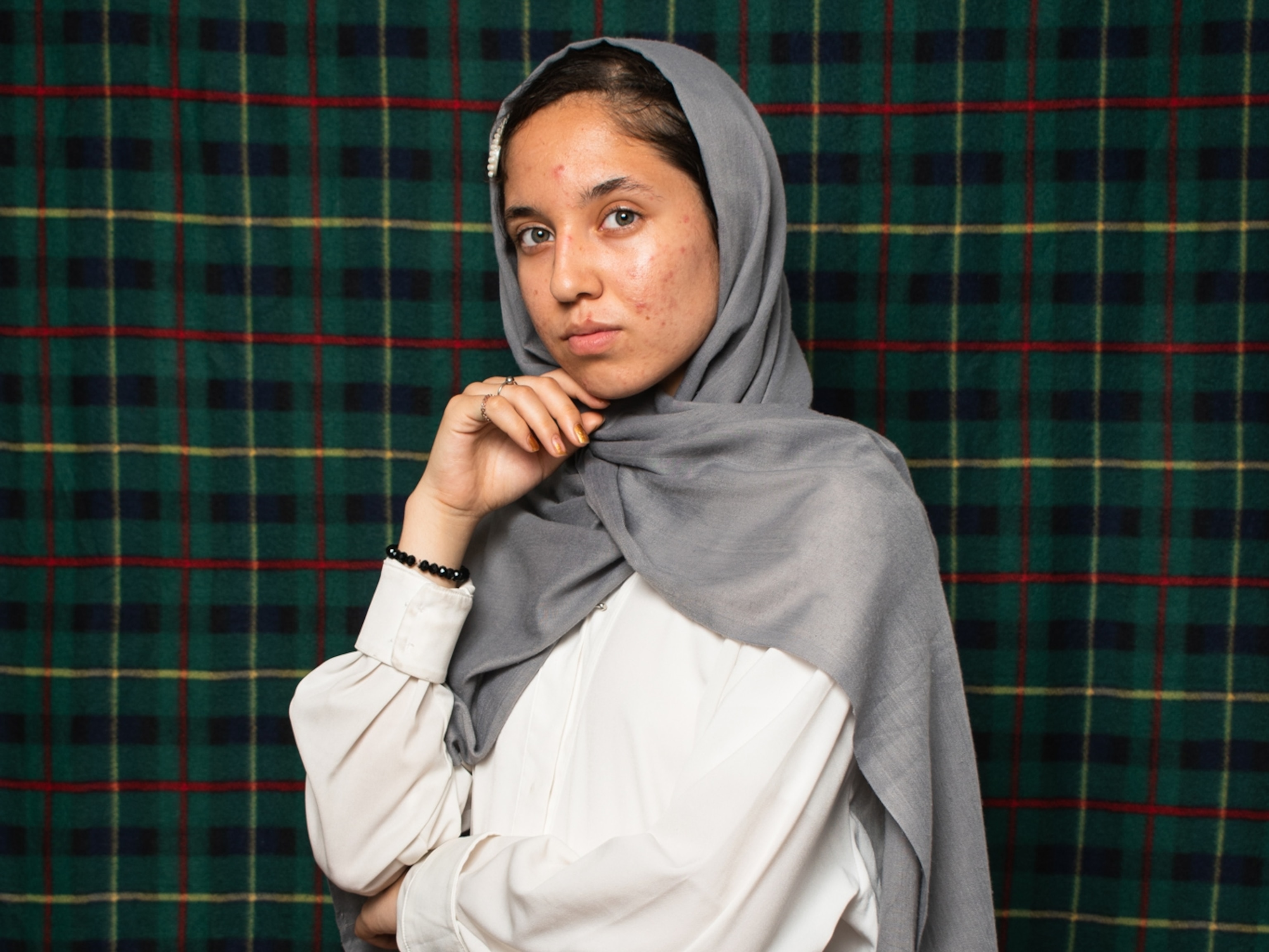
Inside the Harrowing Journeys of Refugee Mothers
Tender portraits illustrate stories of heartbreak and courage from women caring for their children while in search of a new life.
When you hear “refugee crisis,” you might envision photos of small boats afloat on dark waters and packed with people wearing neon-orange life vests. You might think of hands reaching for loved ones across fences, of borders being guarded by men with machine guns, of makeshift tent settlements teeming with homeless families. The pictures we think of are high-energy, chaotic, and full of movement.
The photographs of Greek photojournalist Myrto Papadopoulos are different. They’re quiet, still, and intimate. Each of these women is a mother, sometimes pregnant, sometimes holding her child.
Papadopoulos has documented the refugee crisis since 2010. As she spent time in refugee camps in Greece, she noticed that women would often be left behind with the children while their husbands forged ahead to find new lives for them in Europe. “I felt the women were left out and were the ones who were really suffering,” Papadopoulos says. “And on the other hand, I felt that they would keep these people moving, and they were the reason to continue the journey. Their children were the reason to continue the journey.”
And for these women, the journey is incredibly difficult. Some give birth while traveling. Papadopoulos says she’s seen women walking while carrying newborns as young as ten days old. Some mothers miscarry due to the harsh physical conditions, others have abortions, and still others suffer the deaths of their small children. There are NGOs in some refugee camps that help with pre- and post-natal care and provide forms of birth control when available. But as a whole, being pregnant or being a mother to young children compounds the hardships that all refugees face.
She asked each of these women to share their experiences. Their stories (edited for length and clarity) accompany their portraits below.








Papadopoulos says that, as trying as the circumstances are, many of the mothers see their children as their main motivation. She explains, “The idea of having a family while being in transit—it's the reason for them to exist. To keep on going. And to keep on believing in a better life.”
But Papadopoulos also notes that while these women are in transit—their former homes destroyed, their future homes undetermined—they are stuck. “The amount of patience that these women have is incredible,” she says. And she wanted to pay tribute to that patience in her photographs. Rather than take a portrait of a woman in a room or against a backdrop, Papadopoulos would have her stand in the refugee camp or in the environment right outside of it. “This has been their home for a year,” she says. “I really wanted the environment within the portrait to show that transit and also that pause.” The women are neither here nor there, neither home nor away. They’re moving but standing still.
“Their life is frozen, you know. They are the ones who continue life, but their actual life is frozen.”
You May Also Like
Go Further
Animals
- This ‘saber-toothed’ salmon wasn’t quite what we thoughtThis ‘saber-toothed’ salmon wasn’t quite what we thought
- Why this rhino-zebra friendship makes perfect senseWhy this rhino-zebra friendship makes perfect sense
- When did bioluminescence evolve? It’s older than we thought.When did bioluminescence evolve? It’s older than we thought.
- Soy, skim … spider. Are any of these technically milk?Soy, skim … spider. Are any of these technically milk?
- This pristine piece of the Amazon shows nature’s resilienceThis pristine piece of the Amazon shows nature’s resilience
Environment
- This pristine piece of the Amazon shows nature’s resilienceThis pristine piece of the Amazon shows nature’s resilience
- Listen to 30 years of climate change transformed into haunting musicListen to 30 years of climate change transformed into haunting music
- This ancient society tried to stop El Niño—with child sacrificeThis ancient society tried to stop El Niño—with child sacrifice
- U.S. plans to clean its drinking water. What does that mean?U.S. plans to clean its drinking water. What does that mean?
History & Culture
- Séances at the White House? Why these first ladies turned to the occultSéances at the White House? Why these first ladies turned to the occult
- Gambling is everywhere now. When is that a problem?Gambling is everywhere now. When is that a problem?
- Beauty is pain—at least it was in 17th-century SpainBeauty is pain—at least it was in 17th-century Spain
- The real spies who inspired ‘The Ministry of Ungentlemanly Warfare’The real spies who inspired ‘The Ministry of Ungentlemanly Warfare’
- Heard of Zoroastrianism? The religion still has fervent followersHeard of Zoroastrianism? The religion still has fervent followers
Science
- Here's how astronomers found one of the rarest phenomenons in spaceHere's how astronomers found one of the rarest phenomenons in space
- Not an extrovert or introvert? There’s a word for that.Not an extrovert or introvert? There’s a word for that.
- NASA has a plan to clean up space junk—but is going green enough?NASA has a plan to clean up space junk—but is going green enough?
- Soy, skim … spider. Are any of these technically milk?Soy, skim … spider. Are any of these technically milk?
- Can aspirin help protect against colorectal cancers?Can aspirin help protect against colorectal cancers?
Travel
- What it's like to hike the Camino del Mayab in MexicoWhat it's like to hike the Camino del Mayab in Mexico
- Is this small English town Yorkshire's culinary capital?Is this small English town Yorkshire's culinary capital?
- Follow in the footsteps of Robin Hood in Sherwood ForestFollow in the footsteps of Robin Hood in Sherwood Forest
- This chef is taking Indian cuisine in a bold new directionThis chef is taking Indian cuisine in a bold new direction




